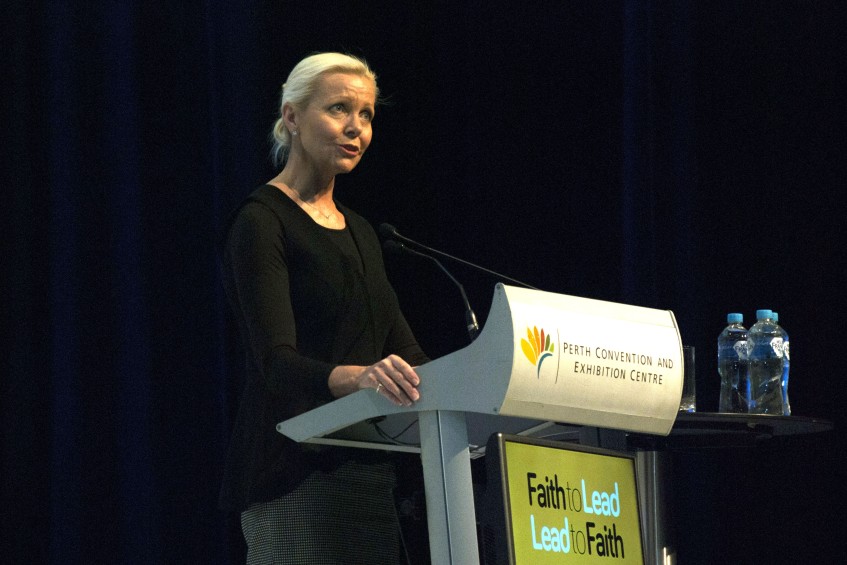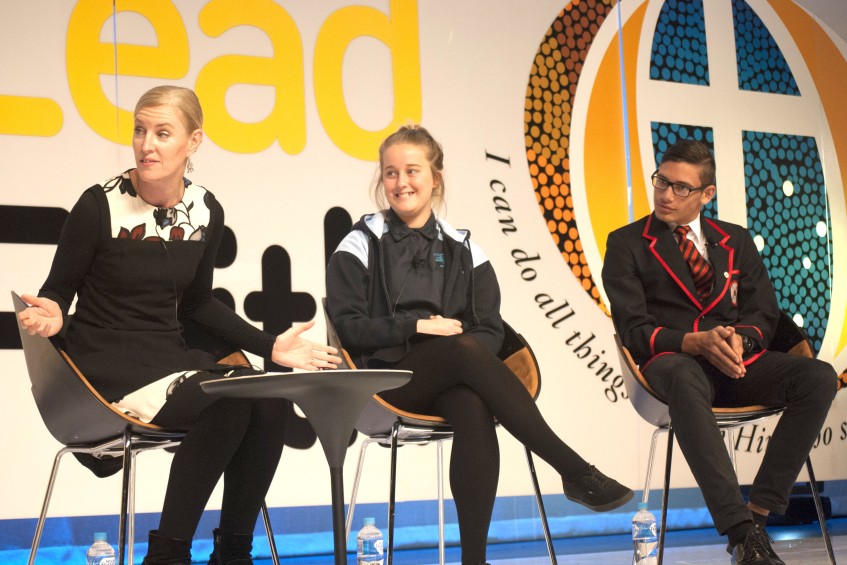2016 NCEC Conference: Chaos is key to children’s development

University of Western Australia Winthrop Professor, Donna Cross, delivers her Keynote Address, titled ‘Not Everything that Counts can be Counted’, at the 2016 National Catholic Education Commission Conference. Photo: Rachel Curry
By Rachel Curry
Children need more chaos in their lives to adequately prepare for the challenges of adulthood, child health researcher, Donna Cross, recently told the 2016 National Catholic Education Commission Conference.
Professor Cross, a Winthrop Professor at the University of Western Australia, is recognised internationally for her research into the mental health and well-being of young people and, in 2012, was named Western Australian of the Year.
Delivering her keynote address, entitled ‘Not Everything that Counts can be Counted’, on Tuesday, 21 June, Professor Cross said today’s children were not given the same opportunities to develop their non-cognitive skills, or ‘soft’ skills, as in the past.
These skills include resilience, perseverance, self-esteem, the ability to interact with others and emotional regulation.
“Very often, in our efforts to create environments that are safe and supportive, we draw out, or draw down, from the sorts of skills that children might need to build resilience,” she said.
“Not that that’s the only non-cognitive skill that we should be addressing, but it’s the one we’ve weakened the most in recent years.
“We need to introduce more chaos into children’s lives, not chaos in the sense that it’s totally uncontrolled, but in controlled environments, spreading chaos so that children get the chance to practise.”
Professor Cross cited the example of Olympic swimmer, Michael Phelps, whose coach, Bob Bowman, would purposely interrupt his race preparation before minor swim meets in order to build up his resilience.
“We call that, in research, social inoculation theory. We need to inoculate our children for experiences that they’re going to have outside of school so that they’re more readily able to cope,” she said.
Professor Cross observed that education staff commonly relied on “the vibe” of their school to judge whether non-cognitive skills were being adequately developed, but this was a mistake.
She said non-cognitive skills needed to be defined and targeted in the same way as cognitive skills, or ‘hard’ skills, such as processing skills, memory and reason.
“The challenge with just having a vibe is we don’t know what to tamper with because we’re afraid we might lose the vibe. And that means that you will run out of energy,” she said.
“If we only continue to run schools on the vibe – it seems to be working well so let’s just keep it going – versus really having a discerning understanding of the pieces that make the most difference… then we’ll not only exhaust ourselves, but not even be really sure what it is that we need to continue to address or enhance.”

MC Karen Tighe hosts the ‘Student Voices’ session, which featured Emma from St Clare’s School and Isaac from Clontarf Aboriginal College, alongside other Year 12 students. Photo: Rachel Curry
Non-cognitive skills should be incorporated into the curriculum, such as in health education classes, Professor Cross said, and students should be given the chance to practise these skills during camps and other activities.
She also encouraged educators to draw on the significant amount of research that had been conducted into the development of the brain in the past 15 years.
“The MRI technology that we have in front of us can see not only how our brain is built, but how it works, and particularly our social brain and the difference that makes,” she said.
“When you think that Catholic schools have invested heavily in the focus of pastoral care and you’ve done it because it seems right, we now have really good quality, vigorous evidence to say, ‘This is the way to go’.”
For example, she said research showed children under four years of age should not be pressured to learn literacy and mathematic skills, a suggestion which drew spontaneous applause from the audience.
“There’s no point. If you look at the period of neural development for optimal growth, that happens later,” she said.
“So, in a sense, we’re wasting energy because, at that time, children need the opportunity to play. They absolutely need to learn how to negotiate and how to cooperate and how to communicate.”
Professor Cross also reminded the conference attendees to look after themselves, not only for their own benefit, but for that of their students.
She said addressing the mental health and well-being of school staff was crucial to supporting children’s well-being.
“It’s the most important finding we’ve had from our research. In fact, one of our studies showed that 40 per cent of the variance between a high functioning school and a lesser functioning school was the principal and the principal’s well-being,” she said.
Following Professor Cross’ address, four Year 12 students from Perth Catholic schools were invited on stage as part of the ‘Student Voices’ session.
The students, from John XXIII College, Aranmore Catholic College, St Clare’s School and Clontarf Aboriginal College, spoke about the belonging and support they felt within the Catholic education system.
When asked by MC Karen Tighe if there was any way their educational experience could be improved, they suggested, somewhat surprisingly, less reliance on technology due to its distracting qualities.
The students also wanted more open discussion during Religious Education classes.
